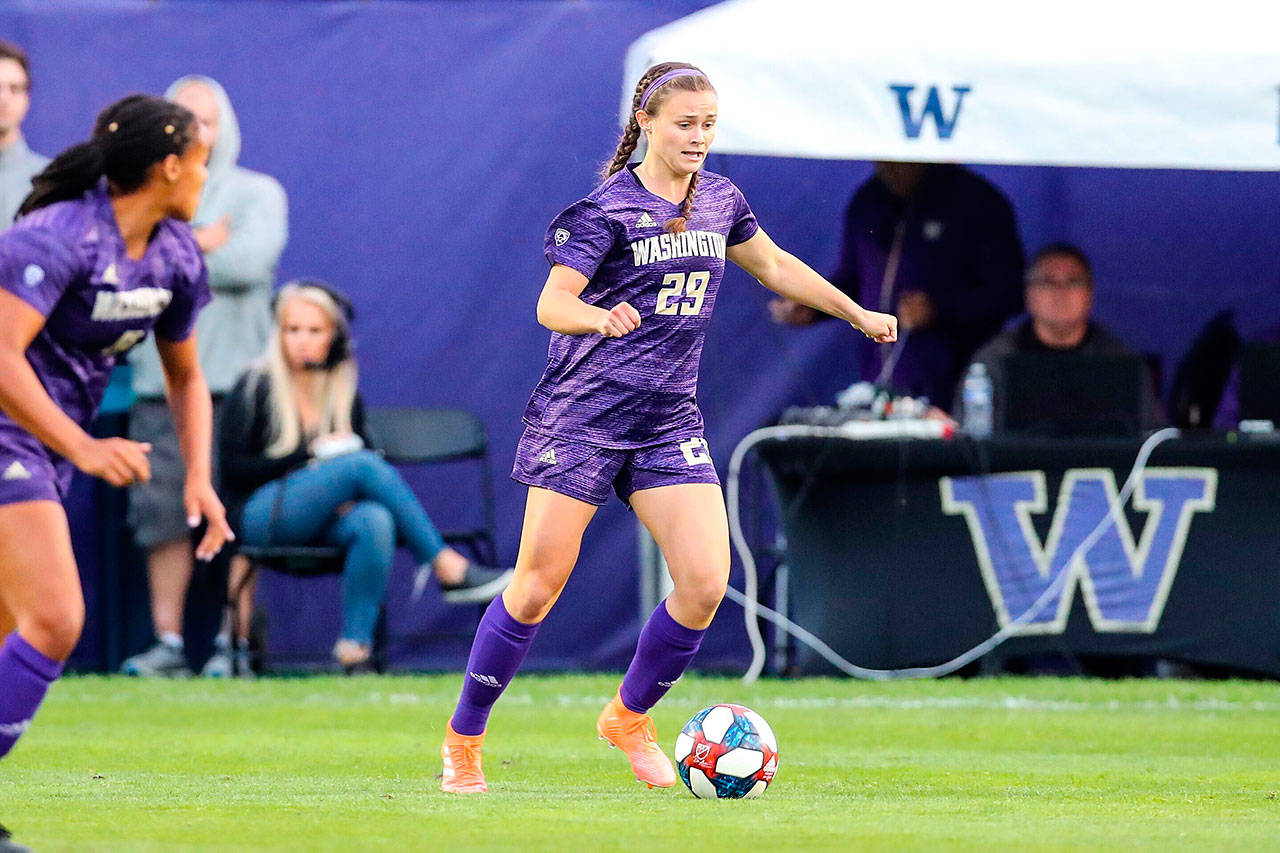For Mary Johnston, a 2017 Oak Harbor High School graduate and a current member of the University of Washington’s women’s soccer team, being recruited to play college athletics was a “mysterious and confusing” process.
After going through the grind, Johnston now wants to help those who are facing the same challenge.
“I am motivated to share my story, experience and tips about getting recruited to play in college,” Johnston said. “I think that getting recruited to play college athletics in high school, especially at a Division I or Power 5 school…can be very stressful.”
Johnston began playing soccer with she was 3 and immediately fell in love with the sport.
She tried other activities — basketball, swimming, softball, track and gymnastics — and enjoyed them all.
“I would have played any sport growing up as long as it didn’t conflict with soccer,” she said.
She started to play select soccer in Oak Harbor at 7. She moved to Virginia at 9 and back to Oak Harbor at 11, beginning a two-year stint with the Northwest Nationals based out of Lynnwood.
Johnston switched to the Crossfire Premier out of Redmond in the eighth grade to play in the Elite Clubs National League, the top league in the state. She stuck with the Crossfire program until she graduated from high school.
Johnston also played for Oak Harbor High School during her sophomore season, which was cut short because of an injury.
“I chose only to play high school soccer for one year because I wanted to give myself the best opportunity to play at the next level,” she said. “Soccer is one of those sports where you get recruited for college through your club team and not your high school team.”
Johnston said she played high school soccer “mostly for fun,” but realized to be recruited to play the highest level of college soccer she would have to dedicate herself to her club team.
Her club coach and current UW men’s soccer associate coach, Rich Reese, suggested she train with boys to further develop her game.
“So, I played club soccer in the winter, spring and summer, and then in the fall, I trained with boys club teams,” Johnston said. “This fall time was a really crucial part of my development. Playing with boys and being able to focus on my individual game helped me to become a more well-rounded player which better prepared me to be recruited by colleges.”
The strategy paid off, and Johnston accepted a scholarship to play for the Big 10’s University of Maryland.
“At the time, it felt right and I was intrigued by going far away and playing in a place I had never experienced before,” Johnston said. “I went with my gut and chose Maryland.”
She enjoyed her time at Maryland, and it helped her grow as a person and soccer player.
“I decided to transfer in the middle of my sophomore year to UW because I wanted to play closer to home as well as play in the Pac-12,” she said. “UW is an amazing school and there is no higher level of collegiate soccer than the Pac-12, so I feel truly blessed to have been able to transfer to play here.”
She added that by switching schools she didn’t mean to infer that she didn’t like her time or gain anything from Maryland.
“Sometimes what may be right for an athlete at the beginning of college may not be what’s right a year or two into college,” she said. “Changing schools isn’t a sign of failure, but simply something athletes have to go through to be in a place they can best excel.”
Johnson now shares her knowledge of the recruiting and transfer processes with high school athletes.
Her first experience came in a casual conversation with four high school players who had questions about the effect the pandemic would have on their hopes to land college scholarships.
“I was extremely blessed to be surrounded by coaches who knew how to guide me in the recruitment process as well as parents who would do and sacrifice anything to help me reach my goals,” she said. “But I know a lot of athletes don’t have the same resources I had, so sharing my story and my knowledge of the process is something I like to do to help athletes, especially ones from Oak Harbor, reach their dreams of college athletics.”
Johnston is set to earn her degree in political science before her eligibility is up. She is undecided if she will continue to play college soccer or begin her professional career in politics or the justice system.
Regardless of what her future holds, she wants to clear the emotional path of those involved in the recruiting process.
She hopes to remove the dazed and confused feeling for athletes on the journey.



